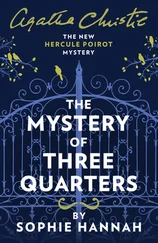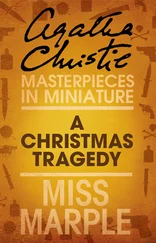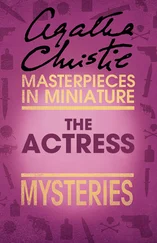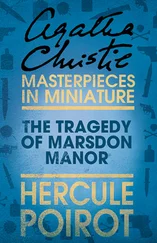Agatha Christie - Three Act Tragedy
Здесь есть возможность читать онлайн «Agatha Christie - Three Act Tragedy» весь текст электронной книги совершенно бесплатно (целиком полную версию без сокращений). В некоторых случаях можно слушать аудио, скачать через торрент в формате fb2 и присутствует краткое содержание. Жанр: Классический детектив, на английском языке. Описание произведения, (предисловие) а так же отзывы посетителей доступны на портале библиотеки ЛибКат.
- Название:Three Act Tragedy
- Автор:
- Жанр:
- Год:неизвестен
- ISBN:нет данных
- Рейтинг книги:4.5 / 5. Голосов: 2
-
Избранное:Добавить в избранное
- Отзывы:
-
Ваша оценка:
- 100
- 1
- 2
- 3
- 4
- 5
Three Act Tragedy: краткое содержание, описание и аннотация
Предлагаем к чтению аннотацию, описание, краткое содержание или предисловие (зависит от того, что написал сам автор книги «Three Act Tragedy»). Если вы не нашли необходимую информацию о книге — напишите в комментариях, мы постараемся отыскать её.
Three Act Tragedy — читать онлайн бесплатно полную книгу (весь текст) целиком
Ниже представлен текст книги, разбитый по страницам. Система сохранения места последней прочитанной страницы, позволяет с удобством читать онлайн бесплатно книгу «Three Act Tragedy», без необходимости каждый раз заново искать на чём Вы остановились. Поставьте закладку, и сможете в любой момент перейти на страницу, на которой закончили чтение.
Интервал:
Закладка:
With growing excitement he and Mr. Satterthwaite smoothed them out. They were clearly several different drafts of a letter – written in a small, neat clerkly handwriting.
This is to say (began the first) that the writer of this does not wish to cause unpleasantness, and may possibly have been mistaken in what he thought he saw tonight, but -
Here the writer had clearly been dissatisfied, and had broken off to start afresh.
John Ellis, butler, presents his compliments, and would be glad of a short interview touching the tragedy tonight before going to the police with certain information in his possession -
Still dissatisfied, the man had tried again.
John Ellis, butler, has certain facts concerning the death of the doctor in his possession. He has not yet given these facts to the police -
In the next one the use of the third person had been abandoned.
I am badly in need of money. A thousand pounds would make all the difference to me. There are certain things I could tell the police, but do not want to make trouble -
The last one was even more unreserved.
I know how the doctor died. I haven’t said anything to the police – yet. If you will meet me -
This letter broke off in a different way – after the “me” the pen had tailed off in a scrawl, and the last five words were all blurred and blotchy. Clearly it was when writing this that Ellis had heard something that alarmed him. He had crumpled up the papers and dashed to conceal them.
Mr. Satterthwaite drew a deep breath.
“I congratulate you, Cartwright,” he said. “Your instinct about that ink-stain was right. Good work. Now let’s see exactly where we stand.”
He paused a minute.
“Ellis, as we thought, is a scoundrel. He wasn’t the murderer, but he knew who the murderer was, and he was preparing to blackmail him or her – ”
“Him or her,” interrupted Sir Charles. “Annoying we don’t know which. Why couldn’t the fellow begin one of his effusions Sir or Madam, then we’d know where we are. Ellis seems to have been an artistic sort of fellow. He was taking a lot of trouble over his blackmailing letter. If only he’d given us one clue – one simple little clue – as to whom that letter was addressed.”
“Never mind,” said Mr. Satterthwaite. “We are getting on. You remember you said that what we wanted to find in this room was a proof of Ellis’s innocence. Well, we’ve found it. These letters show that he was innocent – of murder, I mean. He was a thorough-paced scoundrel in other ways. But he didn’t murder Sir Bartholomew Strange. Somebody else did it that. Someone who murdered Babbington also. I think even the police will have to come round to our view now.”
“You’re going to tell them about this?”
Sir Charles’s voice expressed dissatisfaction.
“I don’t see that we can do otherwise. Why?”
“Well -” Sir Charles sat down on the bed. His brow furrowed itself in thought. “How can I put it best? At the moment we know something that nobody else does. The police are looking for Ellis. They think he’s the murderer. Everyone knows that they think he’s the murderer. So the real criminal must be feeling pretty good. He (or she) will be not exactly off his or her guard, but feeling – well, comfortable. Isn’t it a pity to upset that state of things? Isn’t that just our chance? I mean our chance of finding a connection between Babbington and one of these people. They don’t know that anyone has connected this death with Babbington’s death. They’ll be unsuspicious. It’s a chance in a hundred.”
“I see what you mean,” said Mr. Satterthwaite. “And I agree with you. It is a chance. But, all the same, I don’t think we can take it. It is our duty as citizens to report this discovery of ours to the police at once. We have no right to withhold it from them.”
Sir Charles looked at him quizzically.
“You’re the pattern of a good citizen, Satterthwaite. I’ve no doubt the orthodox thing must be done – but I’m not nearly such a good citizen as you are. I should have no scruples in keeping this find to myself for a day or two – only a day or two – eh? No? Well, I give in. let us be pillars of law and order.”
“You see,” explained Mr. Satterthwaite, “Johnson is a friend of mine, and he was very decent about it all – let us into all the police were doing – gave us full information, and all that.”
“Oh, you’re right,” sighed Sir Charles. “Quite right. Only, after all, no one but me thought of looking under that gas stove. The idea never occurred to one of those thickheaded policeman… But have it your own way. I say, Satterthwaite, where do you think Ellis is now?”
“I presume,” said Mr. Satterthwaite, “that he got what he wanted. He was paid to disappear, and he did disappear – most effectually.”
“Yes,” said Sir Charles. “I suppose that is the explanation.”
He gave a slight shiver.
“I don’t like this room, Satterthwaite. Come out of it.”
12
Sir Charles and Mr. Satterthwaite arrived back in London the following evening.
The interview with Colonel Johnson had had to be very tactfully conducted. Superintendent Crossfield had not been too pleased that mere “gentlemen” should have found what he and his assistants had missed. He was at some pains to save his face.
“Very creditable, indeed, sir. I confess I never thought of looking under the gas fire. As a matter of fact, it beats me what set you looking there.”
The two men had not gone into a detailed account of how theorising from an ink-blot had led to the discovery. “Just nosing around,” was how Sir Charles had put it.
“Still, look you did,” continued the Superintendent, “and were justified. Not that what you’ve found is much surprise to me. You see, it stands to reason that if Ellis wasn’t the murderer, he must have disappeared for some reason or other, and it’s been in the back of my mind all along that blackmail might have been his line of business.”
One thing did arise from their discovery. Colonel Johnson was going to communicate with the Loomouth police. The death of Stephen Babbington ought certainly to be investigated.
“And if they find he died from nicotine poisoning, even Crossfield will admit the two deaths are connected,” said Sir Charles when they were speeding towards London.
He was still a little disgruntled at having had to hand over his discovery to the police.
Mr. Satterthwaite had soothed him by pointing out that the information was not to be made public or given to the press.
“The guilty person will have no misgivings. The search for Ellis will still be continued.”
Sir Charles admitted that that was true.
On arrival in London, he explained to Mr. Satterthwaite, he proposed to get in touch with Egg Lytton Gore. Her letter had been written from an address in Belgrave Square. He hoped that she might still be there.
Mr. Satterthwaite gravely approved this course. He himself was anxious to see Egg. It was arranged that Sir Charles should ring her up as soon as they reached London.
Egg proved to be still in town. She and her mother were staying with relatives and were not returning to Loomouth for about a week. Egg was easily prevailed upon to come out and dine with the two men.
“She can’t come here very well, I suppose,” said Sir Charles, looking round his luxurious flat. “Her mother mightn’t like it, eh? Of course we could have Miss Milray, too but I’d rather not. To tell the truth, Miss Milray cramps my style a bit. She’s so efficient that she gives me an inferiority complex.”
Mr. Satterthwaite suggested his house. In the end it was arranged to dine at the Berkeley. Afterwards, if Egg liked, they could adjourn elsewhere.
Читать дальшеИнтервал:
Закладка:
Похожие книги на «Three Act Tragedy»
Представляем Вашему вниманию похожие книги на «Three Act Tragedy» списком для выбора. Мы отобрали схожую по названию и смыслу литературу в надежде предоставить читателям больше вариантов отыскать новые, интересные, ещё непрочитанные произведения.
Обсуждение, отзывы о книге «Three Act Tragedy» и просто собственные мнения читателей. Оставьте ваши комментарии, напишите, что Вы думаете о произведении, его смысле или главных героях. Укажите что конкретно понравилось, а что нет, и почему Вы так считаете.












